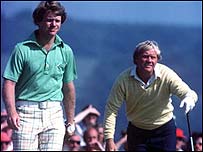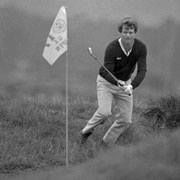 The road to excellence and success naturally takes one through difficult experiences. Tom Watson has walked that road before on and off the golf course. “If you want to increase your success rate,” said Watson, “double your failure rate.” I suppose thats what we fans have the hardest time understanding sometimes. Examples abound: Phil Mickelson was once “the best player to have never won a major,” Tiger Woods went through his “slumps,” Greg Norman had his epic meltdowns, and Tom Watson was once thought of as a “choker.”
The road to excellence and success naturally takes one through difficult experiences. Tom Watson has walked that road before on and off the golf course. “If you want to increase your success rate,” said Watson, “double your failure rate.” I suppose thats what we fans have the hardest time understanding sometimes. Examples abound: Phil Mickelson was once “the best player to have never won a major,” Tiger Woods went through his “slumps,” Greg Norman had his epic meltdowns, and Tom Watson was once thought of as a “choker.”
Early in his career Watson struggled to close the deal with a final round lead. This was punctuated by his inability to put the 1974 U.S. Open away. With his first major victory within grasp he shot a 41 on the second nine to finish the tournament well out of the hunt.
What he may have lacked in immediate ability in those days he made up for in determination and hard work later because, as history records, he learned how to face pressure.
Watson turned to Byron Nelson for guidance in those days and it produced impressive results. One of the truths that Watson took to heart was a lesson that Nelson had proven out during the 1945 season. “Never hit a careless shot,” was the thought that Nelson had carried with him as he won 11 straight Tour victories and an amazing 18 in 1945.
Watson developed a steely competitive edge that none, not even the likes of Jack Nicklaus, could shatter during Watson’s best days. These days the watching world awaits someone who can take on Tiger Woods head to head on Sunday afternoon in any tournament, major or not. Regardless of all the talk, Big Five, and other factors Tiger is largely unchallenged head to head. Things were largely the same for a certain Jack Nicklaus until Tom Watson came along.
With two majors to his credit Watson came to the 1977 British Open hoping, like the rest of the field, for a win.
 What Watson needed most, particularly around Nicklaus, was an impenetrable wall around his emotions. It has often been said of Nicklaus (and any great champion for that matter) that he could win by intimidating you. If he had you in his sights the sheer force of his will and personality would have you missing crucial shots and putts.
What Watson needed most, particularly around Nicklaus, was an impenetrable wall around his emotions. It has often been said of Nicklaus (and any great champion for that matter) that he could win by intimidating you. If he had you in his sights the sheer force of his will and personality would have you missing crucial shots and putts.
Regardless of what Nicklaus brought to the table that final round in 1977, Watson was alone in his thoughts. The two traded blows all day until Watson holed a birdie putt on the final hole after hitting a seven-iron stiff to finish 65, 65 in the two final rounds to Nicklaus’ 65, 66. Tom Watson faced golf’s grizzly bear and won. Watson later said that, “I hit it dead flush. It was one of the best shots I ever hit. Its something I will never forget.”
He had robbed Nicklaus of another green jacket just months before their “Duel in the Sun” and was destined to rob Nicklaus of further glory at the U.S. Open. Another of golf’s immortal shots came at the 1982 U.S. Open when Watson chipped in for birdie from the deep rough. Nicklaus and Watson were tied for the lead when Watson hit into the deep rough at the 17th and his hopes for an up and down looked bleak. “I thought it was over,” said Nicklaus years later. “I thought I had won the tournament.” Bruce Edwards, Watson’s caddie said, “Get it close.” “I’m not gonna get it close,” said Watson, “I’m gonna make it!” and he did.
 What I wonder, as a golf fan, is why Watson isn’t given more credit. Perhaps it was his shaky start, the fact that Nicklaus’ 18 majors dwarfs Watson’s 8, or Watson’s tumble from greatness as he began to doubt his putting stroke. Whatever the reason, Watson is undoubtedly one of golf’s greatest competitors. He honed his ability to perform under pressure and he is responsible for some of the greatest moments in the history of golf.
What I wonder, as a golf fan, is why Watson isn’t given more credit. Perhaps it was his shaky start, the fact that Nicklaus’ 18 majors dwarfs Watson’s 8, or Watson’s tumble from greatness as he began to doubt his putting stroke. Whatever the reason, Watson is undoubtedly one of golf’s greatest competitors. He honed his ability to perform under pressure and he is responsible for some of the greatest moments in the history of golf.
Watson has always been perceived as a quiet character and even a bit of a stick in the mud. Course designer Robert Trent Jones, Jr. has said that, “Tom plays like he’s in a cathedral.” Watson criticized Bill Murray for dancing in a bunker with a spectator at a pro-am and Gary McChord for what he considered unnecessary and frivolous commentary.
He’s never backed down from what he believes to be right and true. He resigned his membership from Kansas City Golf Club for their discriminatory behavior and refused to take endorsement deals from makers of clubs he didn’t or wouldn’t play. Maybe he’s been marginalized to some degree, but he’s stayed true to what he believes regardless of what money or popularity that might be within his grasp.
This highlights some of the reasons why I believe Tom Watson should be regarded by golf fans as one of the greatest champions in all of golf. He accomplished so much in a short time in an era when golf’s greatest player was still plying his trade. All told, Watson collected five British Open titles, two Masters, and one U.S. Open for a total of 8 majors. He has 39 victories on the PGA Tour and 6 on the Champions Tour. Not bad for someone that people once thought couldn’t close the deal.

I have been a Tom fan since the late seventys , and he is one of the top five golfers to live. Also he carries his-self with great character and determination. The rest of could use some of his ability to lift the game of golf like he has. I have only watched him live for one tourniment and was not disappointed. He is class with a capitol C. I hope to follow him in the final senior major.